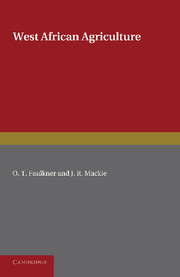Chapter 1 - Introductory
from PART I - GENERAL
Published online by Cambridge University Press: 05 June 2016
Summary
The application of scientific methods of investigation to the problems of agriculture in West Africa is a comparatively recent development. The only agencies that can undertake this are the Governments through their Agricultural Departments, and in their present form these departments are really a post-War development. It was the activities of traders that first led to the establishment of Colonial Government in West Africa, and this fact had a considerable influence for many years on the general policy of the Governments. Yet neither the early Governments nor even the Chartered Niger Company, took the view that their only duty or interest was to protect the traders and facilitate their operations. At a very early date many valuable plants were introduced from other parts of the tropics in the hope of their being adopted by the natives of the country, and eventually Botanic Gardens were established and officers appointed, whose special function was this introduction of new crops and economic plants. But the main object in view was still an immediate increase in export trade, and this tendency persisted even when Agricultural Departments were established. Indeed the motive for their establishment seems to have been chiefly the hope of inducing the people, by more consistent propaganda, to adopt new crops—which they had frequently proved reluctant to do, in spite of persuasion and promise of future profit. “Quick returns” in the shape of increased production of export crops were similarly expected of the new Agricultural Departments, and their efforts to achieve these quick returns left them little opportunity for such a study of local farming and local conditions as alone could show what improvements were really feasible and likely to commend themselves to the native farmer. In any case the departments at first lacked adequate funds and staff. None the less they did much useful spade work; and by the time the War started, they had been able to define in some degree the problems before them; and to indicate the possibilities of progress. The staffs and funds of the departments were just being increased when the War caused all their activities to be suspended until a fresh start was made in 1921 or 1922.
The principle which guides all the actions of the Governments of West Africa to-day is the principle of trusteeship.
- Type
- Chapter
- Information
- West African Agriculture , pp. 3 - 12Publisher: Cambridge University PressPrint publication year: 2013



